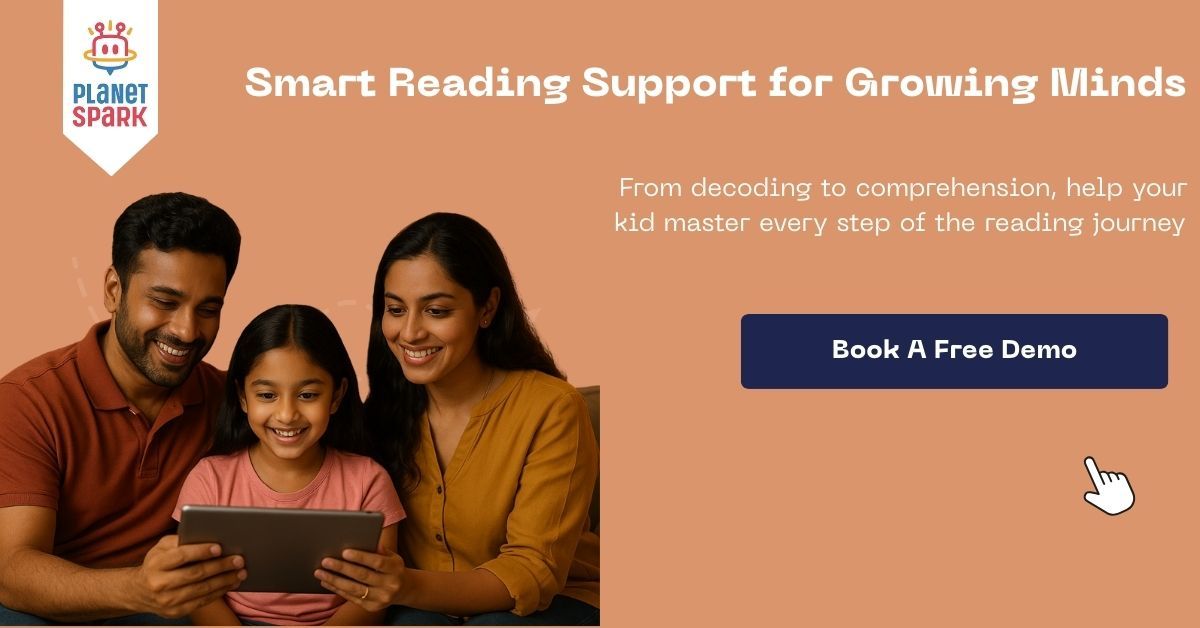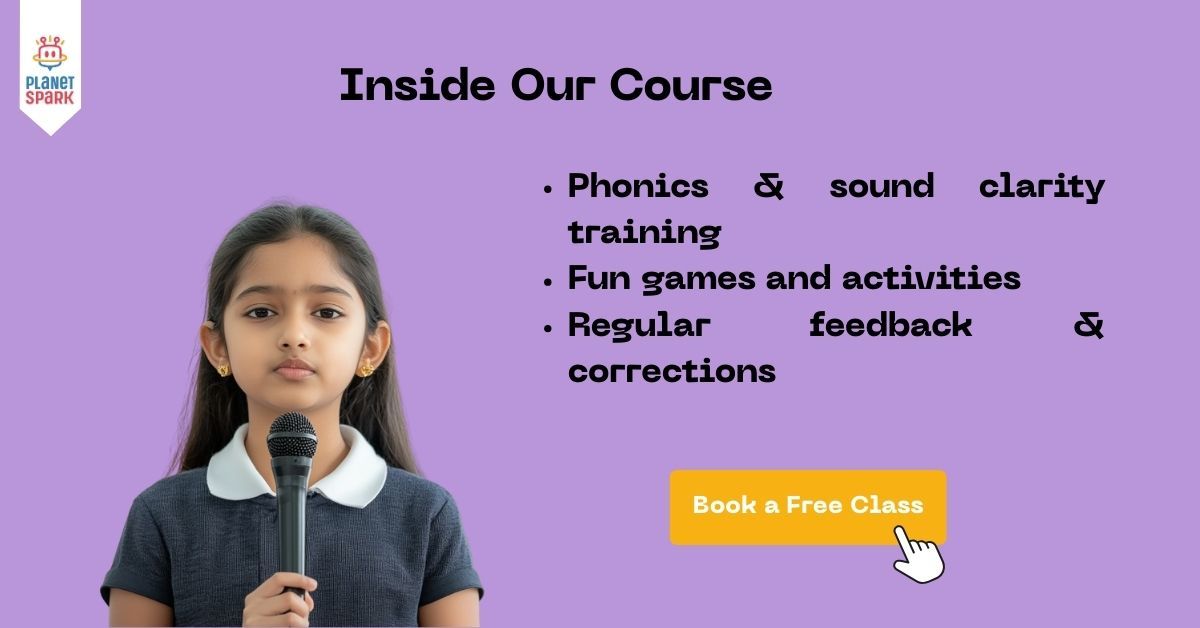How to Motivate Kids to Study: A Parent’s Guide

Table of Contents
- Create a Reading-Rich Environment
- Give Children Choices and a Voice
- Show Enthusiasm for Their Interests
- Use Play as a Learning Tool
- Understand this with an Example
- Why Motivation Matters in Learning
- Celebrate Small Wins
- Focus on Strengths and Talents
- Turn Everyday Moments into Learning Opportunities
- Help Kids Stay Organized
- Avoid Pressure, Encourage Curiosity
- About PlanetSpark
- Conclusion: Every Child Learns Differently
Every parent has faced this question at some point: how to motivate kids to study without endless nagging, bribing, or power struggles? For many, the quick solution is to promise rewards such as a new toy, an extra hour of screen time, or even pocket money.
In this blog, we’ll explore practical strategies, real-life examples, and even frameworks from PlanetSpark, a global learning platform that helps kids fall in love with learning through communication and confidence-building programs.
Create a Reading-Rich Environment
One of the best ways to motivate your child to study is by surrounding them with books and reading opportunities. Children who grow up in homes where reading is valued are more likely to develop a natural curiosity for learning.
Read with your child every day, even if it’s just 10 minutes.
Take turns reading with older kids or establish a family reading hour where everyone picks their own book.
Fill your home with print materials: novels, newspapers, magazines, posters, even placemats with words.
For example, if your child loves animals, stock up on storybooks about wildlife. Curiosity naturally grows when children see their interests reflected in the material.
Give Children Choices and a Voice
Children thrive when they feel respected and involved in decisions. You can motivate kids to study, by introducing enagaging activity like- 25 Picture Description to learn that give them a sense of control.
Let them choose a subject to study first.
Ask for their opinion on what extracurricular activities they’d like.
Encourage them to express feelings about schoolwork openly.
A small decision, like letting your child decide whether to do math before English, creates ownership. Ownership then leads to accountability.
Show Enthusiasm for Their Interests
Children are naturally motivated when they see genuine excitement from their parents. If your child is obsessed with dinosaurs, don’t just hand them a textbook but also explore together. Watch a documentary, read dinosaur stories, or visit a museum.
One parent shared how her son, who loved cricket, resisted math homework. She introduced cricket scorecards and asked him to calculate batting averages. Suddenly, math wasn’t boring but it connected to his passion.
By linking studies to hobbies, you show kids that learning is everywhere.

Use Play as a Learning Tool
Kids under K–12, especially younger ones, learn best through play. Instead of forcing rigid study routines, incorporate play-based learning.
Use blocks for sequencing or math concepts.
Play spelling or word games at the dinner table.
Turn grocery shopping into a math activity by letting your child calculate totals.
This approach not only boosts motivation but also strengthens problem-solving skills and creativity.
Understand this with an Example
Kids notice what you do more than what you say. If you expect them to keep their phone away during study time but they see you scrolling through social media while working, the message gets lost.
Model the behavior you want:
Read while they read.
Share what you learned during the day.
Show curiosity about new topics.
When children see you enjoying learning, they naturally mirror that behavior.
Why Motivation Matters in Learning
Motivation is like the fuel that powers a child’s academic journey. A motivated student is more curious, focused, and willing to overcome challenges. On the other hand, a child who studies only because of fear or rewards often loses interest over time.
Take the example of Riya, a 10-year-old who dreaded reading assignments. Her parents tried rewarding her with ice cream after every completed chapter, but she still resisted. When they switched to reading together as a family, something changed. Riya felt supported, saw her parents enjoying books, and slowly developed a love for reading. Within months, she began picking up books on her own.
This shows us that kids are more inspired by encouragement, role modeling, and experiences than by external bribes.
Celebrate Small Wins
Recognition is a powerful motivator. Don’t wait for big achievements like top grades to celebrate. Small wins deserve appreciation too.
Finished a tough assignment? Treat them with a fun activity.
Completed a book? Let them choose the next family movie.
Celebrating effort rather than just outcomes builds resilience. It teaches kids that learning is about progress, not perfection.
Focus on Strengths and Talents
Not every child excels in every subject, and that’s okay. Instead of only pointing out weaknesses, highlight what they do well.
For example:
If your child struggles in math but loves writing, encourage journaling alongside extra math practice.
If they enjoy drawing, let them illustrate science concepts.
Focusing on strengths builds confidence, which then spills over into tougher subjects.
Turn Everyday Moments into Learning Opportunities
Daily life is full of chances to learn. Encourage kids to ask questions and make connections:
Cooking teaches measurements and sequencing.
A family walk can turn into a nature lesson.
Watching the news can spark discussions about history or geography.
When kids see learning as part of life, studying feels less like a chore.
Help Kids Stay Organized
Sometimes, kids resist studying not because they’re lazy, but because they feel overwhelmed.
Break tasks into smaller chunks.
Use planners or checklists for assignments.
Teach them to keep school papers sorted.
Organization gives kids a sense of control and reduces anxiety.
Avoid Pressure, Encourage Curiosity
Parents often fall into the trap of asking only about grades or test scores. Instead, ask questions like:
1. Ask About New Learnings
Instead of asking only about grades, ask, “What’s something new you learned today?” This encourages children to reflect on their lessons and identify key takeaways. It shifts the focus from results to understanding. By thinking about what they learned, kids strengthen memory retention and curiosity.
2. Explore Enjoyable Moments
Questions like, “What part of the lesson was the most fun?” help children connect learning with enjoyment. Recognizing what they enjoyed motivates them to engage more actively. It also gives parents insight into their child’s interests and strengths. Learning becomes more meaningful when fun is involved.
3. Encourage Teaching Others
Asking, “Can you teach me what you learned?” allows children to explain concepts in their own words. Teaching reinforces understanding, improves communication skills, and boosts confidence. It also helps parents see how well their child has grasped the topic.
4. Focus on Effort and Process
Praise curiosity, questions, and problem-solving rather than only correct answers. Discussing the learning process helps children appreciate effort, develop resilience, and enjoy learning for its own sake. This builds a growth mindset and long-term motivation.
5. Foster Reflection and Discussion
Encourage children to talk about challenges or questions they had during lessons. Reflection strengthens critical thinking and helps identify areas needing improvement. It turns routine homework or lessons into meaningful conversations and shared learning experiences.
About PlanetSpark
PlanetSpark is a global learning platform focused on communication, confidence, and leadership skills for kids aged 4–16. With interactive, tech-driven classrooms, certified teachers, and gamified lessons, it helps children not only study better but also build essential life skills.
Fun and Interactive English Learning
PlanetSpark transforms tricky English topics into enjoyable, engaging experiences. Instead of relying on rote memorization, children learn through interactive storytelling, role plays, and live sessions. This approach makes even challenging concepts like silent letters or irregular verbs easy to grasp.
Accent Neutralization and Clear Articulation
Specialized modules focus on reducing mother tongue influence, improving phonetics, and mastering accurate pronunciation.
Live Expert Trainers
One-on-one sessions with trained communication experts ensure personalized attention. Trainers guide each child based on their unique strengths and areas for improvement, helping them progress steadily.
AI-Powered Feedback
Advanced AI tools provide instant feedback on pronunciation, intonation, and fluency. This real-time guidance allows children to correct mistakes immediately and track their improvement over time.
Gamified Learning
Interactive games and challenges make practice fun and engaging. Children enjoy learning while reinforcing key concepts through playful exercises.
By combining structured learning, expert guidance, and creativity, PlanetSpark ensures that children not only learn English but also develop a genuine love for the language, making every session exciting and rewarding.
For parents wondering how to motivate kids to study, PlanetSpark offers frameworks that spark curiosity, build confidence, and make learning a joyful process.

Conclusion: Every Child Learns Differently
There is no one size fits all way to motivate kids to study. Some flourish through play, others through routine, and many benefit from a mix of both. The key is to focus on your child’s personality, strengths, and interests. Encourage a reading rich environment, offer choices, and celebrate small achievements. Lead by example and show the behavior you wish to see. Connect learning with your child’s passions, and let curiosity, not pressure, be your guiding tool. With patience, creativity, and the right support systems, study time can become a space of discovery and growth.
Frequently Asked Questions
Instead of offering toys or money, focus on intrinsic motivation. Encourage curiosity, read together, celebrate small efforts, and show enthusiasm for your child’s interests. This builds a long-term love for learning.
First, try to understand the reason like is it boredom, difficulty, or stress? Break tasks into smaller steps, use play-based methods, and connect studies with their passions. If resistance continues, consider professional guidance or structured programs like PlanetSpark.
There’s no fixed rule. Younger kids (K–5) should focus on shorter, fun learning sessions of 20–30 minutes, while older kids can handle 45–60 minutes with breaks. Quality matters more than quantity.
Create a distraction-free study space, set clear routines, and model the behavior yourself (avoid phone use when they are studying). Short breaks and physical activity also help kids refocus.
Effort matters more in the long run. Praise your child for persistence, creativity, and improvement. Focusing only on grades can create stress and reduce intrinsic motivation.
PlanetSpark combines fun, gamified lessons with expert coaching in communication, writing, and confidence-building. Children learn through real-world activities, making study sessions enjoyable and purposeful, which naturally increases motivation.
Personalized Communication Report
Record a video to get a AI generated personalized communication report for your child
